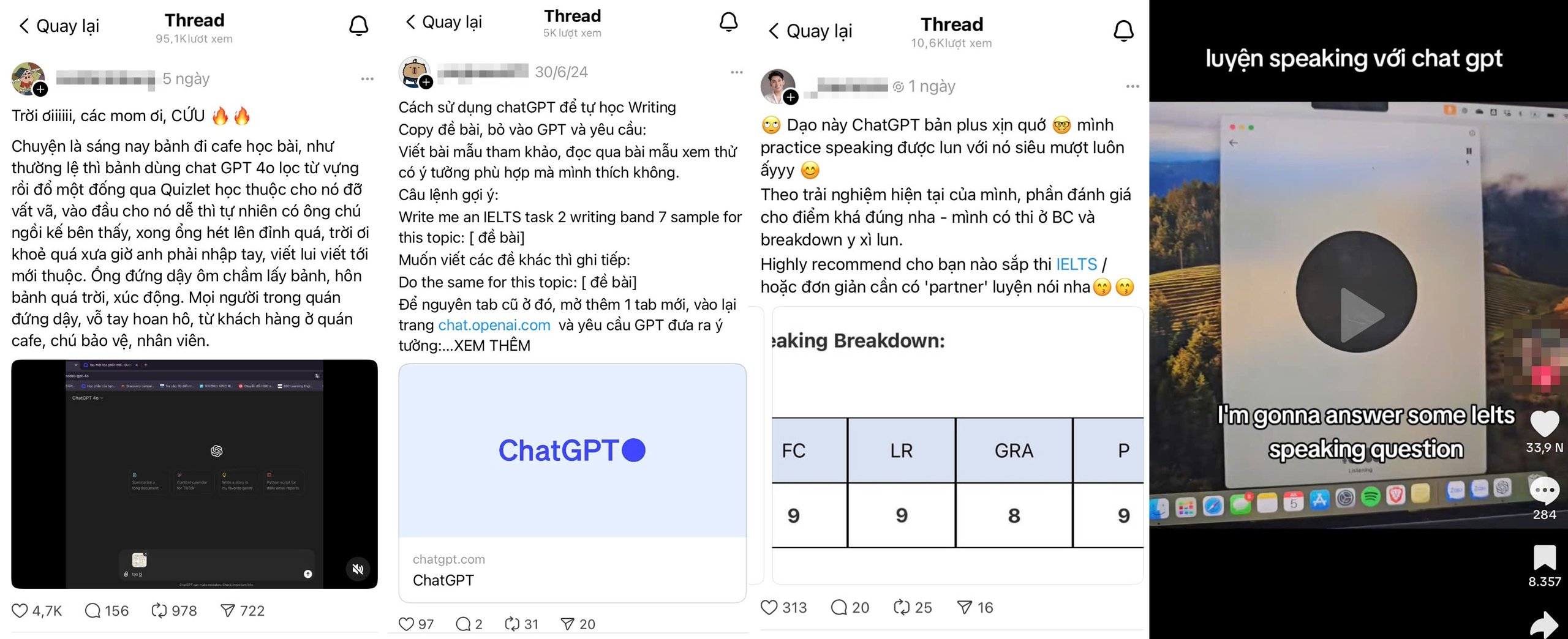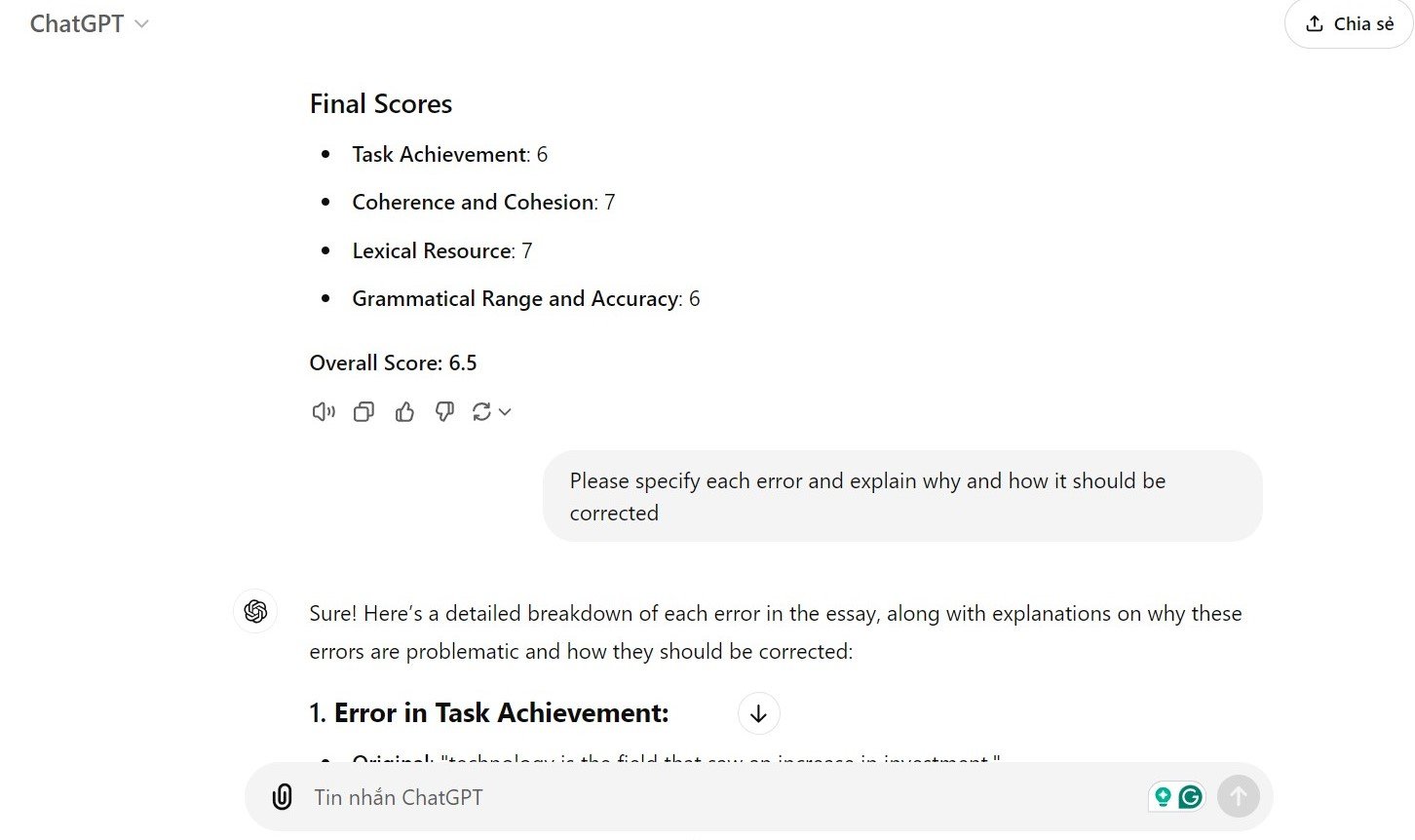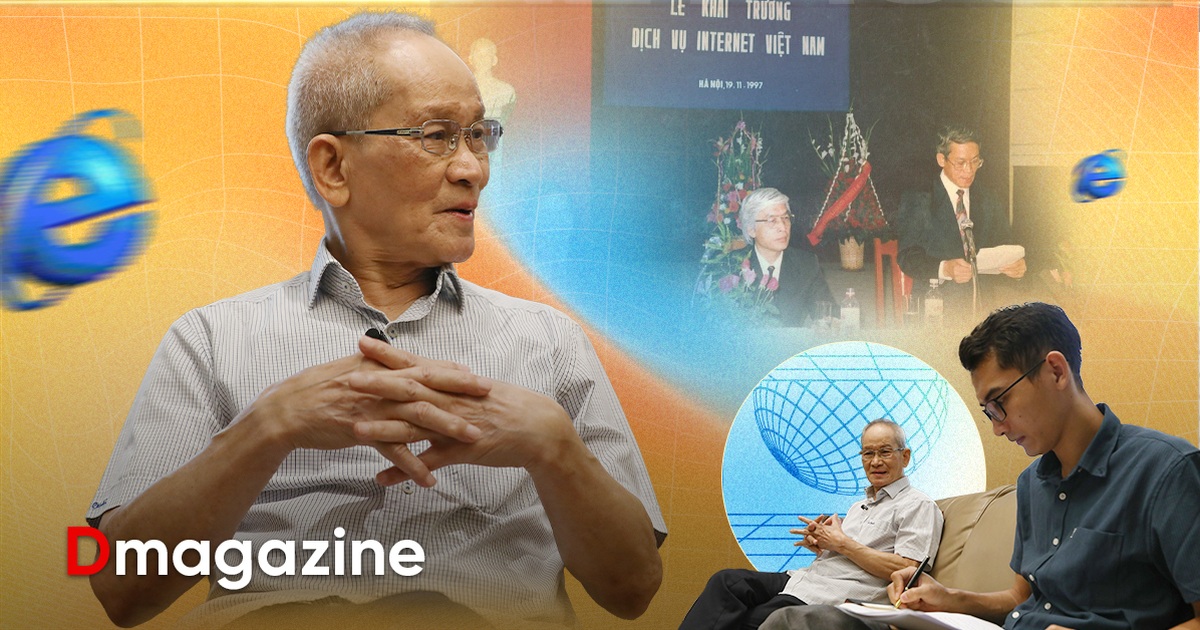
Many accounts share the application of AI tools in the IELTS preparation process
Recently, social networks TikTok and Threads have posted many articles sharing ways to learn IELTS using AI tools such as ChatGPT and Gemini, attracting thousands of interactions. Specifically, using AI is often applied to two skills: IELTS speaking and writing, and also to increase vocabulary. In general, accounts all think that this is an effective way to learn, but is it true?
Many benefits when studying IELTS
Using AI to self-study two skills of writing and speaking in IELTS, Le Quang Tra Giang, a 12th grade student at Trinh Hoai Duc High School ( Binh Duong ) has achieved a score of 7.0, in which the speaking and writing scores are 6.5 and 7.0 respectively. Giang said that he often asks ChatGPT to prepare answers for parts 2 and 3 of the speaking test and this tool will send back detailed outlines, helping him learn how to think, develop ideas and "collect" more specialized and advanced vocabulary.
Ho Tuan Anh, a fourth-year student at the University of Social Sciences and Humanities in Ho Chi Minh City, also uses AI to practice writing skills. "I often ask ChatGPT to grade my papers and explain the good and bad points in my writing. This way of learning helps me save a lot of money. Instead of hiring someone to grade my papers for a price ranging from 100,000 to 500,000 VND per paper, ChatGPT does it completely for free," the male student said.
Mr. Nguyen Dang Ho Bach, IELTS teacher at Kien Luyen Center ( Hanoi ), affirmed that AI is bringing many unprecedented advantages to language learning. For example, in speaking skills, students can interact with ChatGPT as in a real exam room, then receive feedback to improve their speaking. This is a new feature that was just introduced this year.

Learners use ChatGPT to score criteria in written tests
In addition, AI also helps students think and develop effective outlines - something that many learners are weak at, according to Master Khuu Hoang Nhat Minh, CEO of Minh Khuu Academy (HCMC).
Master Minh also noted that many current classes have up to 50 students, which poses a challenge for teachers in teaching and interacting with foreign languages. "Therefore, students can use AI to improve their language accuracy such as vocabulary, pronunciation, and grammar. It can help improve the quality of their language production," Mr. Minh shared.
Beware of risks
Although it brings many benefits, according to some learners and experts, we should not rely entirely on AI tools when learning foreign languages. Because, according to Tra Giang, ChatGPT once provided her with incorrect knowledge, making her more careful when using it, such as actively checking the results returned by AI. Some users said that ChatGPT scores the test incorrectly, often lower than the actual level of the test taker.
Explaining the scoring process , Mr. Ho Bach said the biggest difference in the scoring method between ChatGPT and real people is the flexibility in the way of expression. For example, candidates often focus on proving their own arguments, even if the arguments are subjective and flawed. This essay will still be highly rated by the examiner if the argument is convincing, while it may be rated lower by AI because this tool only looks at the correctness or falsity of the knowledge.

Many users "complain" about the limitations of using AI tools to practice IELTS
"Many learners, especially those at the intermediate or low level, will find it difficult to distinguish between relying on AI to complete a lesson, or actually using it to improve learning efficiency in the long term," Mr. Ho added. According to the male teacher, in speaking skills, AI will do a good job of providing feedback on vocabulary and grammar. However, with the criteria of coherence, cohesion, and pronunciation, Mr. Bach still encourages students to practice with classmates and teachers.
"We need to focus on communication and making the examiner understand what we are saying. When communicating with AI, we only try to give good and good answers, not focusing on the communication factor, leading to machine learning, hindering the coherence and cohesion factor. Similar to pronunciation, ChatGPT can point out mistakes, then humans can correct them directly by illustrating and sharing experiences," the male teacher compared.
Sharing the same view, Master Nhat Minh said that the biggest limitation of AI is the lack of "humanity" in communication. This could create a generation that uses language like "machines" without proper guidance from experts.
"Language learning cannot rely entirely on AI but must have human-to-human interaction, whether it is between teachers and students or between students themselves," Mr. Minh emphasized.
Suggest some commands to use in AI tools
With writing skills, Master Nhat Minh suggests using some commands with each part as follows:
- Describe the process: Describe the process illustrated in the image. Break down each step and aim for a band 8 with cohesive description and a range of complex sentence structures .
- Description of the data table: W rite a detailed description of the data presented in the table in the provided image. Target a band 7 score by comparing figures effectively and using accurate vocabulary .
- Essay sample: W rite a model essay for IELTS Writing Task 2 on the topic: 'How does social media impact individuals and society?'. Aim for a band 9 by fully developing arguments, using advanced vocabulary, and providing a cohesive structure .
- Build vocabulary: Create a vocabulary list of 20 words for the topic 'Climate change' in IELTS Writing Task 2, including synonyms and definitions. Focus on vocabulary for band 8 and above .
- Analyze the sample essay: A nalyze a high-scoring IELTS Writing Task 2 sample essay on 'Environmental pollution'. Explain how it meets the criteria for a band 8 or 9, focusing on task achievement, coherence, and vocabulary use .
Regarding speaking skills, from the lecture of Mr. Daniel F. Almon, IELTS training expert, Mr. Ho Bach said that learners can use the following command to ensure that the AI tool simulates the IELTS examiner in the exam room most accurately.
" For this thread, treat these as permanent rules unless otherwise specified.
Overarching goal: always act as authentically as possible to be an IELTS examiner.
This means:
- Only ask the question type specified
- Do not prompt with terms such as 'Here's the next question' as the examiner will not do this. Instead, go straight into asking the next question.
- Do not prompt after the questions with terms such as 'What's your answer?' or 'What do you think?' or 'What's your response?' or 'Your answer?'; this part can be omitted.
- Do not respond with affirmations such as 'Great to hear about your commitment to upskilling'. Again, an examiner is restricted by their script and unable to give these responses although they are typical for English conversation ."
After completing the practice with ChatGPT, learners should also ask for further feedback on how to improve, specifically on grammar and vocabulary criteria, using the command: " Give me feedback on my grammar and vocabulary. How could they be improved? "
Source: https://thanhnien.vn/co-nen-tu-hoc-ielts-bang-chatgpt-gemini-theo-xu-huong-mang-185241009172627322.htm












































































































Comment (0)